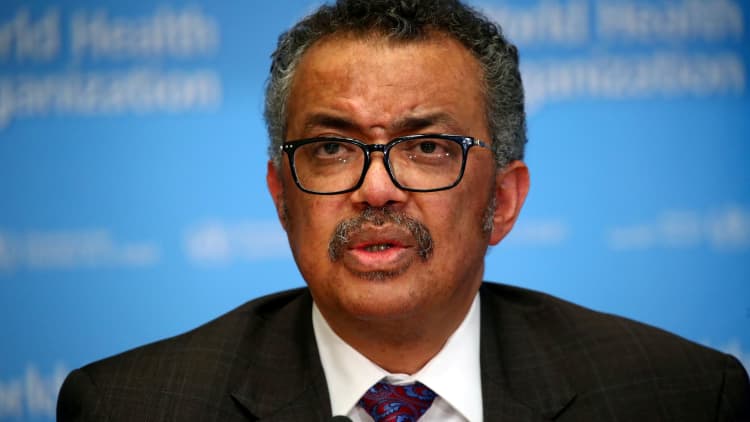The Department of Health and Human Services said Thursday that the rate of deaths from the coronavirus in the United States should begin to fall in the "next couple of weeks."
The seven-day rolling average of coronavirus infections is beginning to drop, and U.S. health officials predict hospitalizations will go down next week and mortality rates will follow in about two weeks, Adm. Brett Giroir, an assistant secretary for health at HHS, said during a press briefing with reporters.
"Nobody's letting up their foot from the gas," he added. "If we throw caution to the wind, go back to the bars, this will all go into reverse."
The U.S. reported 71,695 new cases of the coronavirus on Wednesday, again topping 70,000 in a single day after four days of slightly lower numbers. The country's total case count is rapidly approaching 4 million, according to data compiled by Johns Hopkins University.
Wednesday's spike sent the average number of new cases to a fresh all-time high of 67,429 per day over the past seven days, up more than 6% compared with a week ago, according to a CNBC analysis of data from Johns Hopkins. The seven-day average dropped slightly for the first time in weeks on Tuesday, according to CNBC's analysis.
Giroir's prediction differs from forecasts at the Centers for Disease Control and Prevention. National and state-level forecasts suggest that the number of new deaths in the U.S. over the next four weeks will likely exceed the number reported over the previous four weeks, according to the CDC. The data also shows rising death tolls in 25 states and one territory over the same period of time.
Giroir said officials are "very concerned" about the outbreaks across the U.S., particularly in the Sun Belt region. Earlier this week, Texas and Florida hit a grim record for daily coronavirus deaths based on a seven-day moving average, as hospitalizations continue to surge in states across the United States.
"You know we've all talked about California, Arizona, Texas and Florida, but we are seeing that our public health measures are starting to make a difference and we're making progress," he said.

He said the U.S. conducts about 770,000 tests per day and the national rate of tests that come back positive is 9.1%. "We're seeing emergency room visits in general, and I'm talking about as a population level, not an individual hot spot, starting to go down across the country," he said.
The comments come two days after President Donald Trump warned that the coronavirus pandemic in the U.S. will probably "get worse before it gets better." He is now urging Americans to wear masks to contain the outbreak after resisting them for months.
"We're asking everybody that, when you are not able to socially distance, wear a mask," Trump said Tuesday at a White House news briefing. "Whether you like the mask or not, they have an impact, they have an effect, and we need everything we can get."
Giroir said Thursday that 90% of the public or more need to wear face coverings in order to curb the spread of the virus. Scientists say the virus can spread through respiratory droplets that pass when an infected person coughs or sneezes. Studies suggest the masks may serve as a helpful barrier to spreading infection.
"If we close the indoor bars, reduce the occupancy of restaurants, have face coverings and hygiene, this is essentially equivalent to shutting down the entire economy, which means shutting down elective surgeries, and everything else that goes with that," he said.
Trump has said he would not call for a nationwide shutdown, saying it would be "completely unsustainable, produce debilitating economic fallback and lead to catastrophic public health consequences." He said the U.S. only initially shut down to prevent hospitals from overflowing and to give public officials more time to secure the equipment and supplies needed to fight Covid-19, like ventilators.

